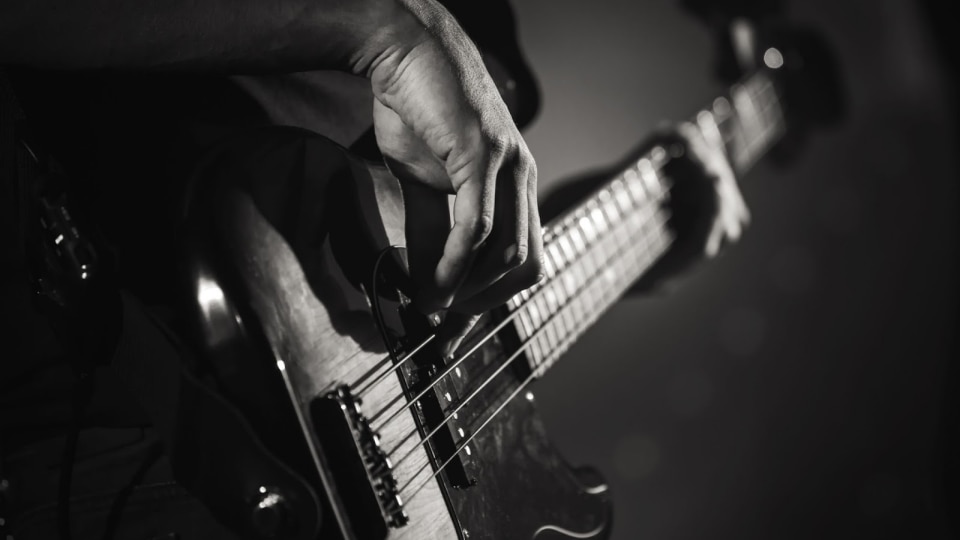Have you been thinking about picking up a musical instrument and can't decide between the bass or the guitar?
Both are incredible instruments with their unique sounds and roles in music, and each can provide a rewarding and creative experience.
Whether you're drawn to the rhythmic undercurrent of the bass or the melodic potential of the guitar, both are fantastic choices for a musical journey.
This article aims to help you understand the key differences between these two instruments and aid in your decision-making process. We'll delve into the roles of the guitar and bass in music, the distinctive sounds they produce, their learning curves, and the respective pros and cons of starting with each.
Whether you're a complete novice or have a bit of musical experience under your belt, we hope this information will be helpful. And remember, with Rocksmith+, which includes both bass and guitar lessons as well as arrangements for both within its library of thousands of songs, you're not alone in this journey. Let's start by exploring the world of the guitar.
What Are the Basics of Playing Guitar?
When you think of some of the most iconic music across various genres, it's hard to ignore the prominence of the guitar. It's a versatile instrument, capable of producing a range of tones and styles that have shaped music history.
The guitar is often the centerpiece in many music genres, from rock and blues to country and jazz. This six-stringed instrument lends itself to both melodic lines and harmonic accompaniment, making it a fantastic choice for solo performers and ensemble musicians alike. It's also capable of creating a vast array of sounds, from the gentle, plucked notes of a classical guitar piece to the electrifying solos in rock music.
Learning to play the guitar provides an opportunity to explore a wealth of chords and scales, which can be both exciting and challenging. The guitar's complexity can be a boon for those who love delving into music theory and understanding the construction of music. However, it can also require a good deal of finger dexterity and practice to master these elements.
One advantage of choosing the guitar as your instrument is the vast array of learning resources available. For instance, Rocksmith+ offers an extensive library of over 7,000 songs that cater to different skill levels, from beginners to more advanced players.
On the flip side, the physical demands of playing the guitar, including managing six strings and forming complex chords, might seem daunting to beginners. But don't worry, with consistent practice and a positive attitude, these initial challenges become stepping stones in your musical journey.
In summary, the guitar is a remarkable instrument that holds a prominent place in music. It offers a rich palette of sounds and a stimulating learning experience. However, it requires a commitment to practice and an eagerness to explore its musical possibilities. Now, let's dive into the world of the bass guitar.
What Are the Basics of Playing the Bass Guitar?
![[RS+] What Are the Basics of Playing the Bass Guitar?](http://staticctf.ubisoft.com/J3yJr34U2pZ2Ieem48Dwy9uqj5PNUQTn/1Xs6L86pdCnvnCWPCxxobm/dff5c6cbbcfb4031a947289a19e3dfee/pasted_image_0.jpg)
The bass guitar, while sometimes overlooked by the casual listener, plays an essential role in shaping the sound and feel of a piece of music. The bass provides the rhythmic and harmonic foundation that ties everything together, making it a vital component in a band or ensemble.
In its most traditional role, the bass guitar carries the rhythm in sync with the drums while also outlining the harmony. It bridges the gap between the rhythmic and melodic elements of a song, giving music depth and richness. The bass often works in the background, but it has a profound impact on the overall groove and feel of the song.
Bass guitars usually have four strings, although five and six-string bass guitars are not uncommon. These fewer strings can make the bass a bit more physically manageable than a guitar, especially for beginners. The basic playing technique typically involves playing one note at a time, contributing to the rhythm and melody, but in a different way than a guitar.
While some might perceive the bass as less glamorous due to its supportive role, playing the bass can be an incredibly fulfilling experience. As a bassist, you become the heartbeat of the band, the glue that holds the other instruments together.
And remember, with a platform like Rocksmith+, you can explore a myriad of songs in the library that can help you master the bass.
However, bear in mind that bass strings are thicker and wider apart than those on a guitar, which might be physically demanding for some. But just like with any instrument, with consistent practice and dedication, these physical challenges can be overcome.
In essence, the bass guitar is an empowering and pivotal instrument in any music setup. It might work subtly in the background, but its contribution is massive, bringing depth, rhythm, and harmony to music. Up next, we'll compare the two instruments side by side to help you decide which might suit you best.
How Do the Bass and Guitar Compare?
Now that we've explored the distinct characteristics and roles of the guitar and the bass, let's directly compare them to help you further in your decision-making process.
In terms of physical characteristics, the bass is generally larger, with thicker strings and wider frets than the guitar. This can make the bass more challenging to handle initially, but with fewer strings to contend with (typically four), some find it easier to start with.
When it comes to playing techniques, the guitar typically involves playing chords and individual notes, allowing for complex melodies and harmonies. Conversely, playing bass typically focuses on individual notes that underpin the rhythm and harmony, though advanced techniques introduce chords and slap-style percussive elements.
As for the learning curve, the guitar may present initial challenges due to the complexity of chord shapes and the dexterity required to play them. Bass, on the other hand, often starts simpler with single-note lines but places a heavy emphasis on timing and groove.
With the focus of the bass guitar being on accompanying notes, walks, and creating the feel for the song, many lead electric guitar players have started their journey on bass guitars, giving you a better understanding of scales.
Both instruments have their unique challenges and rewards. It's essential to consider your personal musical preferences, comfort, and the role you want to play in music. Up next, we'll discuss these factors to consider when choosing between bass and guitar.
What Should You Consider When Choosing Between Bass and Guitar?
![[RS+] What Should You Consider When Choosing Between Bass and Guitar?](http://staticctf.ubisoft.com/J3yJr34U2pZ2Ieem48Dwy9uqj5PNUQTn/4MGd8DJWN57nJB7WJgFngo/3b613b7ef70c95352fb5e8f4c2e333b9/AdobeStock_207711813.jpeg)
Your choice between bass and guitar should be guided by your personal preferences and aspirations.
Ask yourself: What kind of music do you love? Do you see yourself holding down the groove or taking the lead with melody and harmonies?
Physical comfort with the instrument also matters. Guitars are smaller and lighter, but basses, while larger, typically have fewer strings to manage.
Also, consider available learning resources. Rocksmith+ offers a vast library of songs for both instruments, helping you learn at your own pace. It's all about what feels right for you and aligns with your musical dreams.
Start Playing
At the end of the day, the choice between bass and guitar is a personal one. If you're drawn to rhythmic, driving patterns that form the backbone of a song, then the bass might be your perfect match. If intricate melodies and harmonies excite you, the guitar could be your instrument of choice. Remember, there's no "right" choice here, just what resonates most with you.
The key is to start somewhere. Beginning your musical journey can feel a little daunting, but the rewards are truly worth it. And remember, whether you choose the bass or the guitar, platforms like Rocksmith+ are there to support you every step of the way with a wide array of songs and resources tailored to your learning needs. And hey, since Rocksmith+ lets you switch between learning all instruments at any time with just one subscription you could even choose to learn both!
Don't worry about mastering everything right away. The joy of music comes not only from the destination but also from the journey itself.
So, pick up an instrument and start playing. Your musical adventure awaits.
Sources:
Overview of the 9 Guitar Types | National Guitar Academy
History of the Bass Guitar: From Jazz to Rock | Musicians Institute









